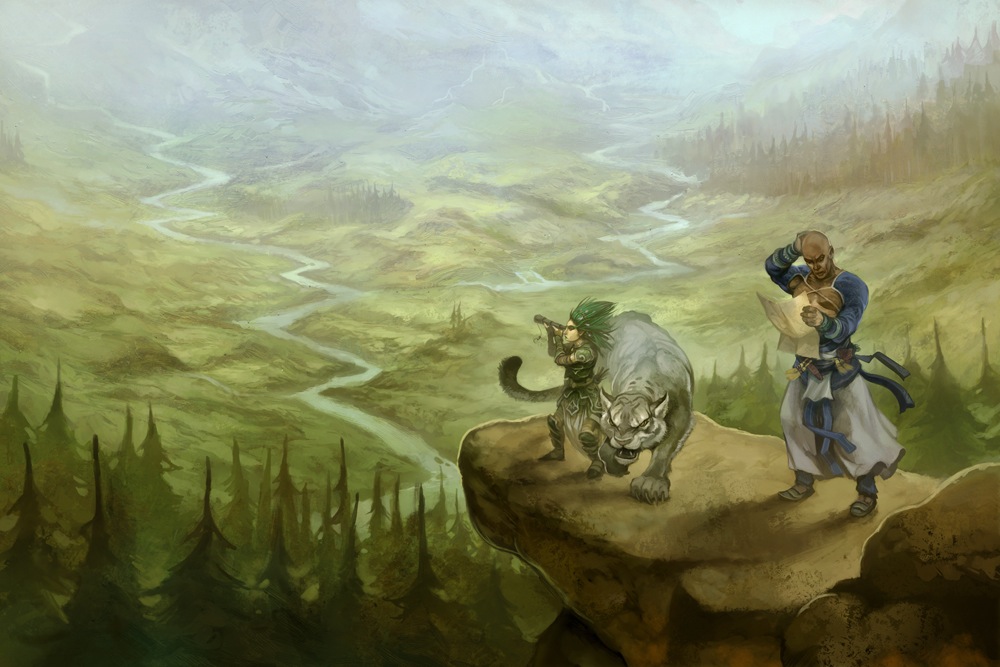Famously*, I homebrew the majority of my adventures, but I don’t write them down. Ideas revolve around my brain like so many aeon stones, and I draw from them as need. This works smoothly in person, as I feed off the energy of the players in the room with me, and I can accompany thinking time with engaging facial expressions and body movements. However, I struggle when GMing online, even running a game with theatre of the mind. Furthermore, now that I have regular opportunities to write published adventures, my lack of experience formulating and formatting my adventure ideas makes what should be a fun opportunity more difficult.
As my list of published adventure credits increases, I’ve learned the hidden benefits of writing adventures. What I’m about to explain might be obvious to you, my fellow GMs. I don’t know, it’s new to me. I hope my recent revelations help other GMs with their reading, writing, and running adventures.
Adventure Cadence
In addition to not writing my own adventures, I struggle running published ones. I’ve read being a homebrew GM described as a brag, so just to be clear: I see this as a personal weakness. All these classic adventures that I hear other groups having amazing experiences with, and I just know would make them worse by running them.
However, the more I write adventures, the more I understand how I’m supposed to read a published adventure. The order of information, what’s emphasized versus what’s implied versus what’s totally up to the GM. I see these skills developing the more adventures I write.
I’m not even sure if the friends I’ve spoken to about running published adventures understand the skills they have that others lack. And I’ve spoken with a lot of friends about this topic. None of them have broken down how to read a published adventure in a way that helps me run one. Writing an adventure, on the other hand, trains my brain for the assumptions adventure writers make about how the reader will approach what they’ve written.
System Mastery
Often when I’m writing my adventures, I flesh out encounters in ways I don’t expect. I’ll, say, write an encounter on the deck of an aircraft carrier. Then when I’m near completion, it hits me that aircraft carriers are so big, they have transport vehicles for crossing the deck. And the aircrafts they carry need to be towed, and fueled. Suddenly a straight forward scene now has optional vehicle combat and explosive scenery.
When I GM, these kinds of elements might come into the scene if players think of them. When I write, I have to ask what players might expect, based on the context of this scenario. This gives me time to research what rules exist for any ideas outside of the straight forward that fit the scene. They might require rules that don’t typically get used. Instead of making a call on the fly or pausing a session to look up how a player’s outside the box idea fits in, I can research ahead of time.
It’s amazing how much easier it is to learn a rule when you need it, and don’t have the pressure of game session flow forcing you to rush your reading. And by you, my fellow GMs, I mean me. I learn so many corner case rules by going to those corners when I am on their case.
Player Abilities
Most players subscribe to the theory that to a hammer, every problem looks like a nail. Fighters want to fight their ways out of problems, wizards want to wiz their ways out. So when I write my adventures, I like to check out the games’ hammer selection.
I know some GMs like to read their players’ character sheets and tailor encounters to the party’s abilities. Personally, I hate it. As a player, very little checks me out of a game faster than feeling like the adventure revolves around me. I love when adventures play out organically, and that my wit and clever application of abilities solved problems. When a situation calls for an item or ability or element of my backstory that only I can handle, I don’t feel like I earn anything by accomplishing that task. I feel pandered to.
That said, when a situation I find myself in can (but not must) be resolved with my abilities, especially abilities I don’t get to use often, I feel justified in the choice I made during character creation that got me here.
Every game has its conditional abilities. It’s disappointing if I gain a conditional ability that never comes into play. So I’ve learned as an adventure writer to read over the abilities players gain at the adventure’s minimum level. Conditional abilities are easy to forget, but if you work the conditions into one of the first adventures a character plays after gaining the ability, not only do they get the satisfaction of playing with their new toy, that satisfaction and memory increases the chances that they (and we) remember they have this ability several levels down the line if the condition applies again.
In Conclusion
I suspect that I’ll still homebrew and improvise home games. It’s when I’m most comfortable, and have the most fun, and I know my players enjoy themselves. However, the more I write adventures, the more I’m tempted to try running published adventures once again. After all, if writing adventures makes me better at running published adventures, maybe running published adventures will make me better at writing them.
*depending on how you measure fame.
Every two weeks, Ryan Costello uses his experience as a Game Master, infused with popular culture references, to share his thoughts on best GMing practices to help his fellow GMs. Often deconstructing conventional wisdom and oft repeated GMing advice, he reminds his fellow GMs that different players play the game in different ways, and for different reasons.






